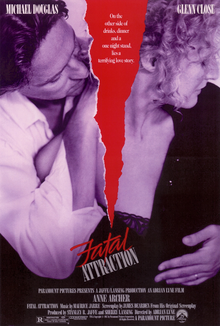Box office
Fatal Attraction grossed $156.6 million in the United States and Canada, and $163.5–187.3 million in other territories, for a worldwide total of $320–344 million. [2] [34] [3]
The film spent eight weeks at number one in the United States, where it was the second-highest-grossing film of 1987, behind Three Men and a Baby . [35] In the United Kingdom, it grossed a record £2,048,421 in its opening week and spent ten weeks at number one. [36] In Australia, it was the first non-Australian film to gross A$2 million in its opening week, second to Crocodile Dundee . [37] Fatal Attraction eventually became the highest-grossing film worldwide in 1987. [38]
Critical response
On the review aggregator website Rotten Tomatoes , 74% of 61 critics' reviews are positive, with an average rating of 6.8/10.The website's consensus reads: "A potboiler in the finest sense, Fatal Attraction is a sultry, juicy thriller that's hard to look away from once it gets going." [39] Metacritic , which uses a weighted average , assigned the film a score of 67 out of 100, based on 16 critics, indicating "generally favorable" reviews. [40] Audiences polled by CinemaScore gave the film an average grade of "A" on an F to A+ scale. [41]
Janet Maslin of The New York Times lauded Lyne's direction, writing that he "takes a brilliantly manipulative approach to what might have been a humdrum subject and shapes a soap opera of exceptional power. Most of that power comes directly from visual imagery, for Mr. Lyne is well versed in making anything –a person, a room, a pile of dishes in a kitchen sink –seem tactile, rich and sexy." [42] Richard Schickel of Time stated that Close and Douglas "gives the film some of its fatal attractiveness. So do James Dearden's plausible, nicely observant script, Adrian Lyne's elegantly unforced direction, and Close's beautifully calibrated descent into lunacy. Together they bring horror home to a place where the grownup moviegoer actually lives." [43]
Author Susan Faludi discussed the film in Backlash: The Undeclared War Against American Women , arguing that major changes had been made to the original plot in order to make Alex wholly negative, while Dan's carelessness and the lack of compassion and responsibility raised no discussion, except for a small number of men's groups who said that Dan was eventually forced to own up to his irresponsibility in that "everyone pays the piper". [44] Close was quoted in 2008 as saying, "Men still come up to me and say, 'You scared the shit out of me.' Sometimes they say, 'You saved my marriage.'" [45] Critic Barry Norman expressed sympathy for feminists who were frustrated by the film, criticized its "over-the-top" ending and called it inferior to Clint Eastwood's Play Misty for Me , which has a similar plot. Nonetheless, he declared it "strong and very well made, excellently played by the three main characters and neatly written." [46] Fatal Attraction has been described as a neo-noir film by some authors. [47]
Fatal Attraction was the first American film to be distributed by United International Pictures in South Korea. In September 1988, Korean film distributors protested this release by "releasing snakes, setting fire in the theatres, and tearing off the screens." [48]
Psychiatrists and film experts have analyzed the character of Alex Forrest and used her as an illustration of borderline personality disorder. [49] She exhibits impulsive behavior, emotional instability, a fear of abandonment, frequent episodes of intense anger, self-harming, and shifting between idealization and devaluation of others, all of which are characteristic of the disorder. The degree to which she displays these traits is not necessarily typical, and aggression in people with borderline personality disorder is often directed toward themselves rather than others. [50] Slant Magazine named her role one of the "15 Famous Movie Psychopaths", and WhatCulture included it in top "10 Most Convincing Movie Psychopath Performances" [51] [52]
As referenced in Orit Kamir's Every Breath You Take: Stalking Narratives and the Law, "Glenn Close's character Alex is quite deliberately made to be an erotomaniac." Gelder reports that Close "consulted three separate shrinks for an inner profile of her character, who is meant to be suffering from a form of an obsessive condition known as de Clérambault's syndrome" (Gelder 1990, 93–94). [53] The term "bunny boiler" is used to describe an obsessive, spurned woman, deriving from the scene where it is discovered that Alex has boiled the family's pet rabbit. [54] [55] [56] [57]
